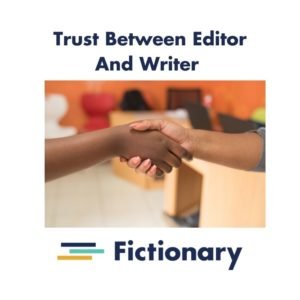
Book Editing & Trust
Trust between an editor and a writer starts before you begin editing a writer’s manuscript. When you connect, you’ll gather information from the writer, so you can assess whether you’re the right editor for them AND whether they are the right client for you.
Interviewing a writer is the first step in building trust. The writer will understand you only want to take on a client if you think you can help them. They’ll know you don’t take every job that comes your way, and that will garner their trust.
Types of Editing
It’s important to ensure the writer understands they are getting a story edit. They may not know the difference between a story edit and a copyedit or proofread.
Before going to the next level of detail, make sure the writer understands what you deliver in an edit. The writer will feel great that you took the time to explain your services.
For example, I only edit in Fictionary StoryCoach software. A writer must know this upfront. If you only use a specific tool for editing, this is the best time to let the writer know.
Round 1: Interaction with the Writer
Before agreeing to perform an edit, the minimum information you want from your potential client is:
- Title of Story
- Blurb (not a synopsis that gives away the ending). It doesn’t have to be formal. It’s to give you an idea of what the story is about.
- Genre
- Word count
- First chapter or first scene
This information helps you assess the writer and their story.
Depending on the genre, the title might give you insight into the theme of the story.
The blurb will help you experience the novel in the same way a reader would if it was published. It contains the information a reader would have before reading the story, and it will influence how you experience the story. If the writer’s goal is to publish their novel, experiencing the story as a reader is important.
The genre tells you if you’re suited for this particular job or if you need to do some research before starting the job.
The word count helps you give a price quote. You’ll also know right away if the writer is following genre guidelines.
Reading the first chapter or scene shows if the writer is ready for a story edit, what the quality of writing is (as in does it need a lot of copyediting), and most importantly, is this a story you can help make powerful?
What does all this have to do with trust between an editor and a writer?
Your first interactions with the writer will allow them to get to know you a bit, and they’ll see you take your editing seriously. You know what questions to ask to evaluate a job, and you won’t take on any job just for the sake of money. It’s more important to ensure you’re a good fit for the writer.
Once you agree to accept the writer as a client, the next set of questions will help you perform a better edit because you’ll understand what the writer is trying to accomplish.
Round 2 of Questions:
- What do they need from an edit?
You can use the answers to help you focus your edit to the writer’s needs.
2. What are their strengths?
This will help you evaluate if they are aware of their strengths and you can mention this in your summary letter.
3. How long have they been working on MS?
You can compliment them on the hard work they’ve put into their story.
Delivering the Book Edit
Assuming you create a summary letter (manuscript critique) to send along with the edit, refer to the answers the writer gave you and it will show the writer you were listening. This creates a full-circle experience for the writer.
The writer has trusted you with something precious. They’ll feel great about the edit, if they trust you!
Ready to Take Your Editing to the Next Level?
A Fictionary StoryCoach helps writers tell a powerful story and makes the writer’s voice shine! You can now try Fictionary StoryCoach for editors for free!
And there’s more. The Fictionary Certified StoryCoach training is available.
Do you want to become a Fictionary Certified StoryCoach? Check out Fictionary Certified StoryCoach Training.
If you’d like to take the training, send me (Kristina) an email at helpful.editor@temp-fictionary.flywheelstaging.com telling me why you’d like to become a Fictionary Certified StoryCoach, and I’ll give you a discount.
The Fictionary StoryCoach Certification training program helps editors deliver a comprehensive and objective editorial package using StoryCoach software.
We developed this training for two reasons.
- The first is for fiction editors to have a place to learn how to perform a high-quality story edit, get certified, and then have a tool (StoryCoach) that helps them perform exceptional story edits.
- The second is for writers to know they are dealing with a professional editor who understands story when they hire a Fictionary Certified StoryCoach.
For more on story coaching check out: What is a Story Coach?

